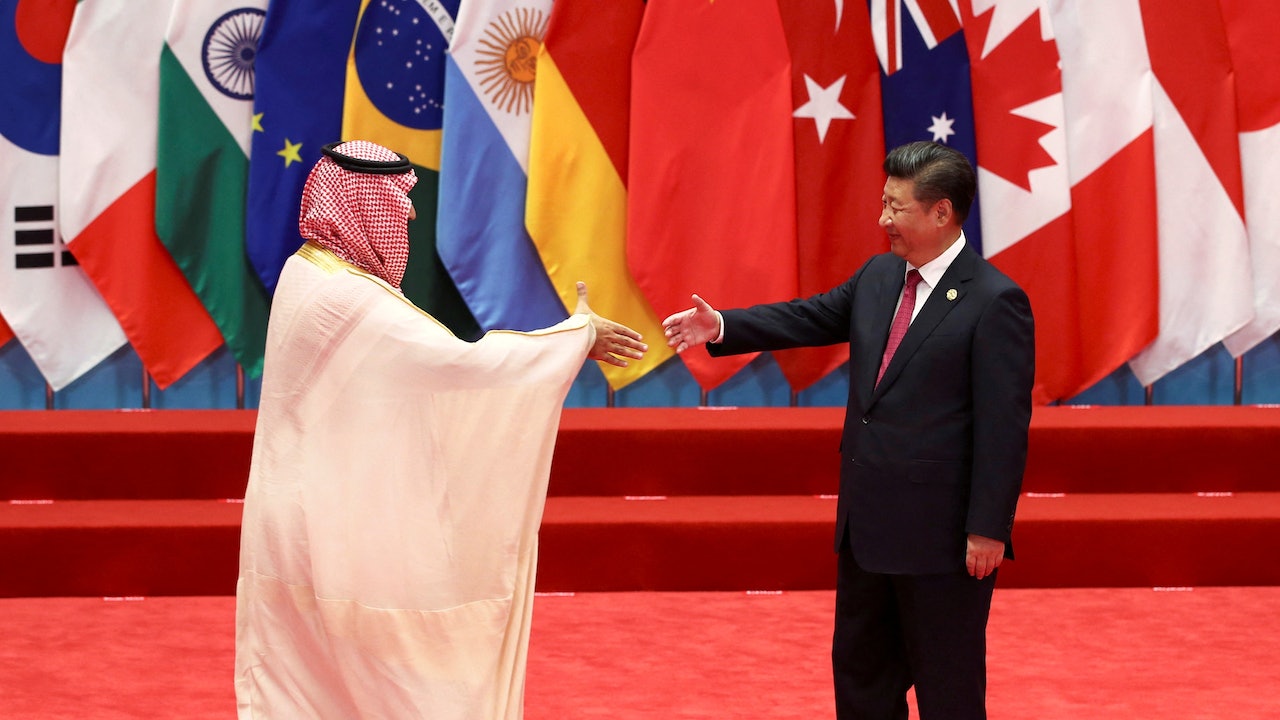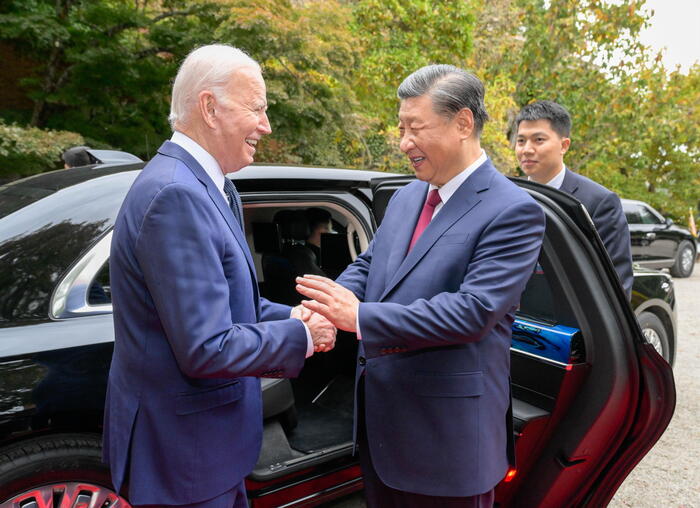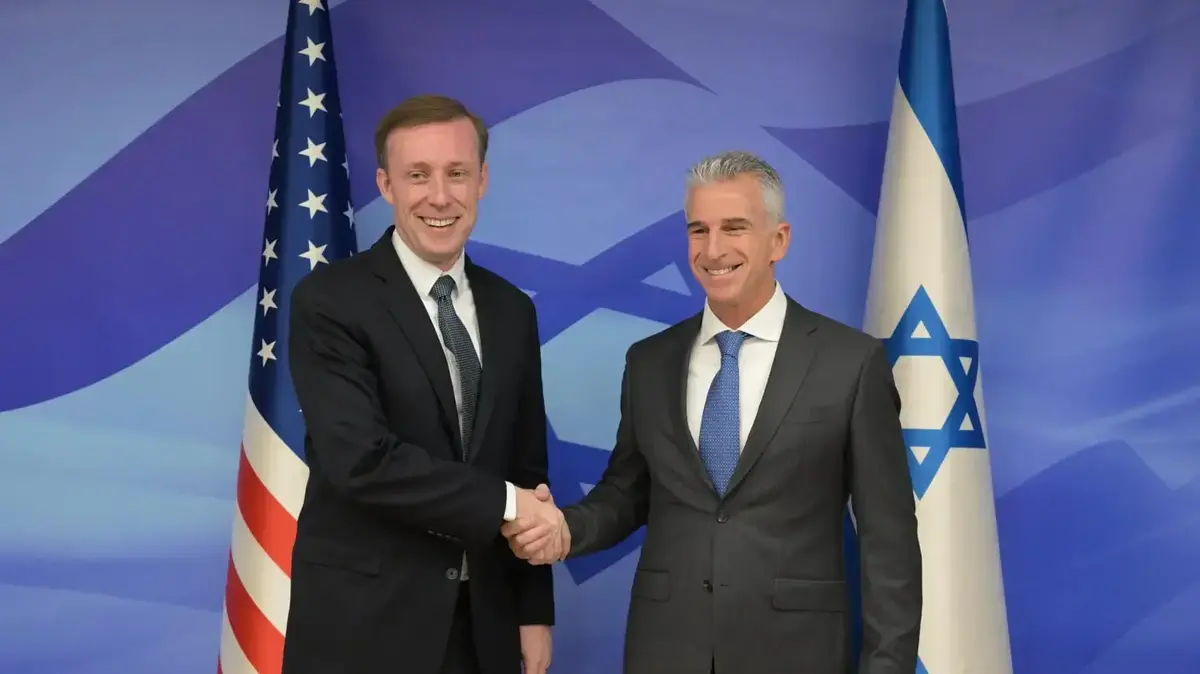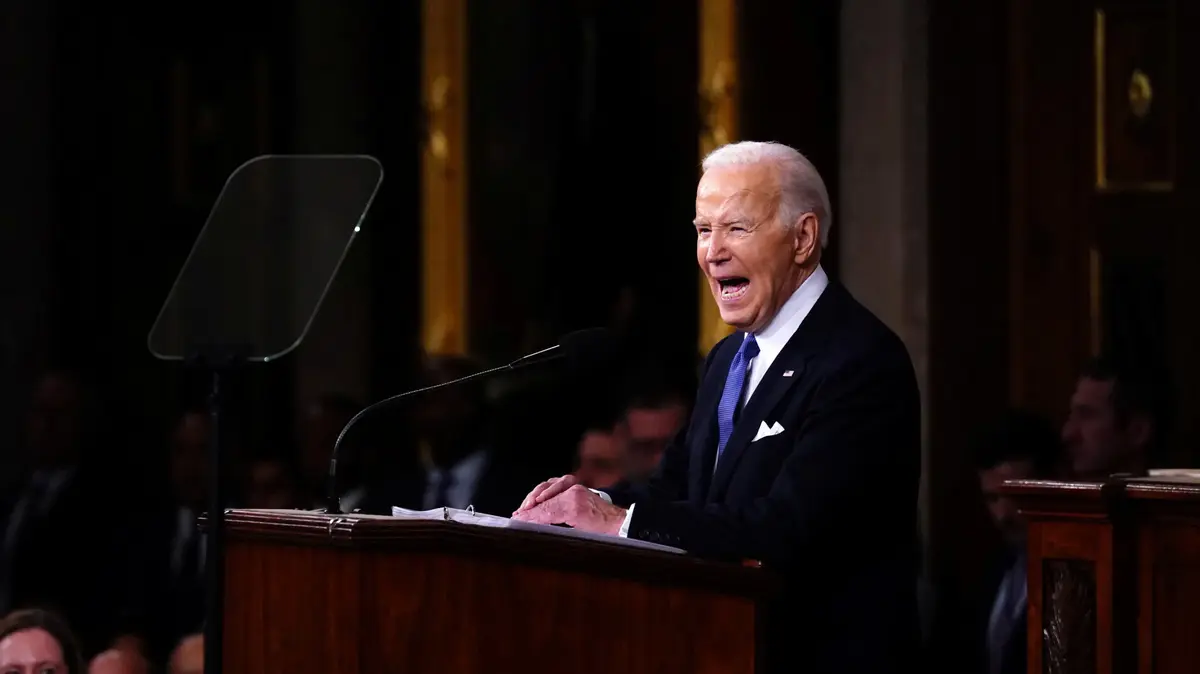After several months of various rumors, and last week Saudi Arabia began to invite various media for interviews with undetermined dates, the Chinese Ministry of Foreign Affairs finally confirmed on December 7 that Chinese President Xi Jinping will visit Saudi Arabia from the 7th to the 10th The capital, Riyadh, attended the first "China-Arab Summit" and paid a state visit to Saudi Arabia.
This state visit has been hailed as the most ostentatious diplomatic ceremony in Riyadh since the then U.S. President Trump (Donald Trump) took Saudi Arabia as his first visit in 2017. The low-key itinerary to Saudi Arabia to "seek oil" is completely incomparable.
According to Saudi sources, King Salman of Saudi Arabia's invitation to Xi Jinping is to strengthen the historic relationship and strategic partnership between the two sides, and will sign a cooperation plan close to 30 billion US dollars.
The Saudi official also specially released an article on the history of Saudi-Chinese relations, pointing out that the close relationship between the two countries has lasted for 80 years. "Oil for security" is equally far-reaching.
This state visit once again highlights in a more concrete way that "the United States is no longer the only one in Saudi Arabia", which has both historical accident and current situation necessity.
U.S. Democratic Party-Saudi Relations Difficult to Repair
On the one hand, the U.S. Democratic Party has been increasingly dominated by ideology in recent years, and has gradually lost the spirit of pragmatic diplomacy. Since Biden came to power, he has taken "democracy against autocracy" as his positioning for the overall situation of the world.
Saudi Arabia, ruled by the monarchy, is of course on the side of "authoritarianism".
This constitutes the fundamental contradiction between the U.S. Democratic government and the Saudi regime, making U.S.-Saudi relations an extension of domestic bipartisan politics in the United States—only the Republican Party can sincerely cooperate with Saudi Arabia.
In 2018, the massacre of Jamal Khashoggi, a Saudi dissident journalist and columnist for the Washington Post, at the Saudi Embassy in Turkey became an irreparable tension between the U.S. Democratic Party and Saudi Crown Prince Mohammed bin Salman, who is actually in power. cracks.
Khashoggi disappeared after entering the Saudi embassy in Istanbul, Turkey on October 2, 2018, and was later confirmed to have been killed.
(AP)
During the election campaign, seeing that the "climax of oil" was approaching under climate change, and that it was difficult for Saudi Arabia to leave the U.S. military umbrella, Biden stated that he would regard Saudi Arabia as a "pariah". Muhammad communicated, and instead fought against the aging King Salman to meet the demands of voters in the Democratic Party who value universal values.
Biden also released the content of the confidential report of the U.S. intelligence agency that Crown Prince Mohammad ordered the killing of Khashoggi, in order to compare with the "immoral" Trump who ignored the "Khaschi incident".
From the very beginning, US-Saudi relations have entered a frozen state.
The Russo-Ukraine War, the Oil Confrontation and Biden's "Back"
This accidental development of history is broken by another accidental history.
The Russia-Uzbekistan war that broke out at the end of February this year pushed up global energy prices as soon as it started. As the West gradually sanctioned Russia's energy exports, oil-producing countries led by Saudi Arabia increased supply to fill Russia's energy gap, and even reduced Russia's energy revenue. It is especially important to the geopolitical strategy of the United States, and it is also very important to Biden's domestic popularity and the midterm election situation.
This constitutes an important bargaining chip for Saudi Arabia to bargain with the Biden administration.
After the Russia-Ukraine war started, Saudi Arabia remained neutral and did not take sides with the United States. It is rumored that Biden tried to personally lobby Saudi Arabia and other countries to increase production, but the Saudi authorities refused to answer the phone.
Faced with rising oil prices for months, Biden finally decided to let go of his ideological insistence and return to a pragmatic diplomatic line. Regardless of domestic criticism, he visited Saudi Arabia in person in July, nominally to visit Israel and then to Saudi Arabia to attend the Gulf Cooperation Council (GCC). ) summit, and then "just happened" to meet with Saudi Crown Prince Mohammed, but in fact this was his personal "pleading guilty" to the crown prince as the president of the United States to "save a little face", hoping to win the latter to increase oil production.
U.S. President Joe Biden arrives in the Red Sea city of Jeddah in Saudi Arabia on July 15.
The picture shows him fist bumping with Saudi Crown Prince Mohammed bin Salam Palace.
(AP)
According to US media reports, this diplomatic performance came from a behind-the-scenes transaction between the US and Saudi Arabia.
The "New York Times" stated that the "cognition" behind Biden's visit was that Saudi Arabia would increase oil production by 750,000 barrels per day, and then the UAE would increase production by 500,000 barrels per day.
However, seeing through Biden's helplessness against Saudi Arabia, Crown Prince Mohammad can be regarded as trying his best to play with Biden's abilities: the OPEC+ meeting in August decided to increase production by 100,000 barrels per day, and immediately reversed production by September. In its first in-person meeting since the outbreak in Vienna in June, OPEC+ cut production by an even bigger 2 million barrels per day.
Biden, who was blindsided before the mid-term elections, was of course furious.
White House spokesperson Karine Jean-Pierre directly criticized OPEC+ for siding with Russia; White House National Security Council spokesman John Kirby even pointed the finger at Saudi Arabia, claiming that Saudi Arabia "forced" other small OPEC countries to cut production in order to "Increasing Russian revenue and undermining effectiveness of (Western) sanctions".
Biden himself has repeatedly stated that Saudi Arabia will bear the "consequences" for this, and has initiated a review of US-Saudi relations.
However, as recently reported by the National Broadcasting Corporation (NBC), no progress has been made in such retrials, and U.S. officials also admitted that there is no viable option for Saudi Arabia. "People realize that if Saudi Arabia is lost, the Gulf will be lost. We need this Security Partnership".
Of course, Biden is well aware of this.
During his visit to Saudi Arabia in July, he stated: "We will not leave, and we will not leave a hole that can be filled by China, Russia, or Iran." In fact, after "seeking oil" failed and was slapped in the face, Biden In terms of actions, they continued to show goodwill to Mohammad. On the grounds that the latter was recently officially appointed as the prime minister of Saudi Arabia, he showed the court that the federal government believed that Mohammed had sovereign immunity, and finally made the civil lawsuit against Mohammad in the Khashoggi case come to an end.
The picture shows that on August 31, 2016, Chinese President Xi Jinping and then Deputy Crown Prince Mohammed of Saudi Arabia held a meeting with officials from both sides before the G20 summit in Hangzhou.
(Reuters)
"Oil for security" is a thing of the past
The problem is that under the inevitable drive of the current situation, the fact that the United States "does not leave" does not mean that there is no hole in the Gulf region for other countries to fill.
The essence of the 80-year alliance between the United States and Saudi Arabia is "oil for security."
But there are holes on both sides of this exchange.
On the one hand, with the development of shale oil extraction technology in the United States, the United States itself has become the world's largest oil producer. The United States' imports of Saudi crude oil and petroleum products have fallen to a low level not seen in nearly 40 years. It has become a relationship between competitors.
In contrast, China, with its rapidly developing economy, has become the largest buyer of Saudi oil and the largest trading partner of Saudi Arabia.
The oil trade-based relationship between the United States and Saudi Arabia and China has undergone tremendous changes over time.
According to Saudi crude oil export data in 2020, China accounts for a quarter of it.
(OEC)
On the other hand, after 20 years of failed wars in Afghanistan and the unnamed, injustice, and doubtful Iraq War, coupled with the "Indo-Pacific turn" in US geopolitics, the value of the US security umbrella has long been greatly reduced.
Under the "protection" of the United States, the Yemeni-backed Houthi militia (Houtis) in Yemen has been making sporadic attacks on Saudi Arabia in recent years, and Saudi Arabia has failed to suppress the expansion of the Houthi organization in Yemen.
In 2019, Saudi oil facilities were attacked by the Houthis, and Saudi Arabia pointedly pointed out that it was done by Iran. In the end, the Trump administration of the United States did not respond strongly to this.
By the beginning of this year, the Houthis had launched their first deadly attack on the UAE, and the White House in a different color had similarly failed to do anything.
Actions are more practical than words. No matter how much Biden insists that the United States will not leave, the United States has actually embarked on the road to withdraw from the Middle East.
With the development of renewable energy, "oil for security" itself has become an outdated product of history. What Saudi Arabia and other Middle Eastern countries need is new development in the post-oil era.
In this regard, the United States has no strategic response.
In contrast, China, which values different oriented diplomatic relations, has naturally become an option for Saudi Arabia. In addition to the oil trade relationship, the two sides have continued to cooperate in surveillance technology, ballistic missiles, drones, 5G infrastructure and other projects in recent years. , the two countries also agreed to integrate China's Belt and Road Initiative with Saudi Arabia's "Vision 2030".
US President Joe Biden (fourth from left) led a delegation to visit Saudi Arabia on July 15, 2022, with Saudi Crown Prince Mohammed bin Salman (not pictured) and other officials at the Al Salam Royal Palace ) to attend work meetings.
(AP)
During Biden's visit in July, although he proposed cooperation with Saudi Arabia on 5G and other infrastructure projects, the belated US has lost the opportunity to redefine US-Saudi relations in the new era.
However, judging from the current situation, China-Saudi Arabia relations must have its upper limit.
Although the "Wall Street Journal" reported in March this year that Saudi Arabia is considering using RMB as oil settlement, but the recent announcement by Saudi officials seems to indicate that this will not be part of Xi Jinping's visit to Saudi Arabia.
The close relationship between China and Iran, as well as Saudi Arabia's long-term reliance on U.S. armaments, also determine that the security cooperation between the United States and Saudi Arabia is still far superior to the security relationship between China and Saudi Arabia.
In other words, the U.S. Democratic government and Saudi Arabia will at least maintain the basic ally relationship between the two countries with a gesture of "face and heart discord".
But in any case, this time Xi Jinping's state visit to Saudi Arabia can also be said to be the second slap in the face of Crown Prince Mohammed. After all, for the United States, Russia is an immediate challenge, and China is a long-term challenge. However, Saudi Arabia has made high-profile gestures to the two.
Biden's inability to do anything about Saudi Arabia and Saudi Arabia's willingness to accept China are actually a microcosm of the general trend of world multipolarization.
Under this new world situation, the United States no longer has the right to speak in various fields around the world, and different countries will pursue national policies that are not in line with the United States' wishes according to their own interests.
The United States has no choice but to forcefully accept this general trend.
Xi Jinping's visit to Saudi Arabia British media: The United States is concerned about whether China and Saudi Arabia will switch to RMB for oil settlements Arabs to sign deals worth more than 227.5 billion


/cloudfront-eu-central-1.images.arcpublishing.com/prisa/5CYUPDL33BHRNA5AWKOZ3OGFK4.JPG)

/cloudfront-eu-central-1.images.arcpublishing.com/prisa/FIJVMOBHZRWVDBKS3NAQ2M4JRE.jpg)


/cloudfront-eu-central-1.images.arcpublishing.com/prisa/DH2SXR3OWJG27DGCQVSC5AQDNE.png)


/cloudfront-eu-central-1.images.arcpublishing.com/prisa/2C5HI6YHNFHDLJSBNWHOIAS2AE.jpeg)




